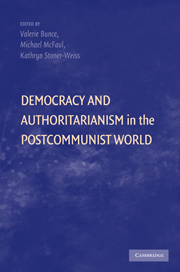Book contents
- Frontmatter
- Contents
- Prologue
- PART I WAVES OF REGIME CHANGE: FROM DICTATORSHIP TO DEMOCRACY…AND BACK?
- PART II ENCOURAGING DEMOCRACY: THE ROLE OF THE EUROPEAN UNION
- 3 When Europeanization Meets Transformation
- 4 Democratization in Postcommunist Europe
- PART III CHOOSING REGIME CHANGE: DEMOCRATIZING ELECTIONS
- PART IV RESISTING REFORM: BACKSLIDING DEMOCRACIES AND ENDURING AUTOCRACIES
- Epilogue
- Index
- References
4 - Democratization in Postcommunist Europe
Illiberal Regimes and the Leverage of the European Union
Published online by Cambridge University Press: 05 June 2012
- Frontmatter
- Contents
- Prologue
- PART I WAVES OF REGIME CHANGE: FROM DICTATORSHIP TO DEMOCRACY…AND BACK?
- PART II ENCOURAGING DEMOCRACY: THE ROLE OF THE EUROPEAN UNION
- 3 When Europeanization Meets Transformation
- 4 Democratization in Postcommunist Europe
- PART III CHOOSING REGIME CHANGE: DEMOCRATIZING ELECTIONS
- PART IV RESISTING REFORM: BACKSLIDING DEMOCRACIES AND ENDURING AUTOCRACIES
- Epilogue
- Index
- References
Summary
The European Union may well be presiding over the most successful democracy-promotion program ever implemented by an international actor. All of the states that have become credible future EU members over the last decade are making progress toward liberal democracy and more transparent market economies. The puzzle is one of causation: Does the EU only accept liberal democracies? Or does the condition of being a credible future EU member create incentives for political actors to make their political agendas compatible with liberal democracy and the state's bid for EU membership?
The convergence that we see toward liberal democracy today is all the more puzzling given the divergence in regimes in the region some fifteen years ago. In some postcommunist states, democratically elected governments began laying the foundations of liberal democracy and implementing comprehensive economic reforms immediately after the collapse of the communist regime. By liberal democracy, I mean a political system where state institutions and democratically elected rulers respect juridical limits on their powers and political liberties. They uphold the rule of law, a separation of powers, and boundaries between the state and the economy. They also uphold basic liberties, such as speech, assembly, religion, and property. Important for our cases, they do not violate the limits on their powers or the political liberties of citizens in order to suppress rival political parties or groups.
- Type
- Chapter
- Information
- Democracy and Authoritarianism in the Postcommunist World , pp. 82 - 104Publisher: Cambridge University PressPrint publication year: 2009
References
- 17
- Cited by



